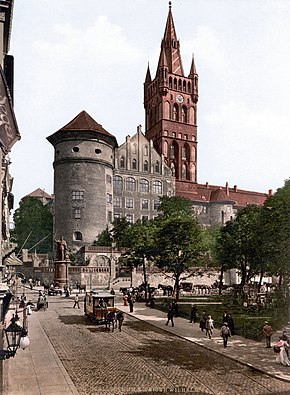Königsberg (Prussia)
| Königsberg in Prussia | |

Königsberg Castle before World War I
|
|
|
Königsberg was a port city on the south eastern corner of the Baltic Sea. It is today known as Kaliningrad.
|
|
| Alternate name | Кёнигсберг |
|---|---|
| Coordinates | 54°43′00″N 20°31′00″E / 54.71667°N 20.51667°ECoordinates: 54°43′00″N 20°31′00″E / 54.71667°N 20.51667°E |
| History | |
| Founded | 1255 |
| Abandoned | 1945 |
| Associated with | Sambians, Germans, Poles, Jews, Lithuanians |
| Events | World War II |
| Site notes | |
| Ownership | Russia |
Königsberg (English pronunciation: /ˈkɜːnɪɡzˌbɜːrɡ/; German pronunciation: [ˈkøːnɪçsˌbɛɐ̯k]) is the historical name for the present-day city of Kaliningrad, Russia. Originally a Sambian or Old Prussian city, it later belonged to the monastic state of the Teutonic Knights, the Duchy of Prussia, the Kingdom of Prussia, the Russian Empire and Germany until 1946. After being largely destroyed in World War II by Soviet forces and annexed by the Soviet Union thereafter, the city was renamed Kaliningrad. Few traces of the former Königsberg remain today.
The literal meaning of Königsberg is 'King’s Mountain'. In the local Low German dialect, spoken by many of its German former inhabitants, the name was Kenigsbarg (pronounced [ˈkʰeːnɪçsbarç]). Further names included Russian: Кёнигсберг, Королевец, tr. Kyonigsberg, Korolevets, Old Prussian: Kunnegsgarbs, Knigsberg, Lithuanian: Karaliaučius, Polish: Królewiec, and Czech: Královec.
...
Wikipedia

